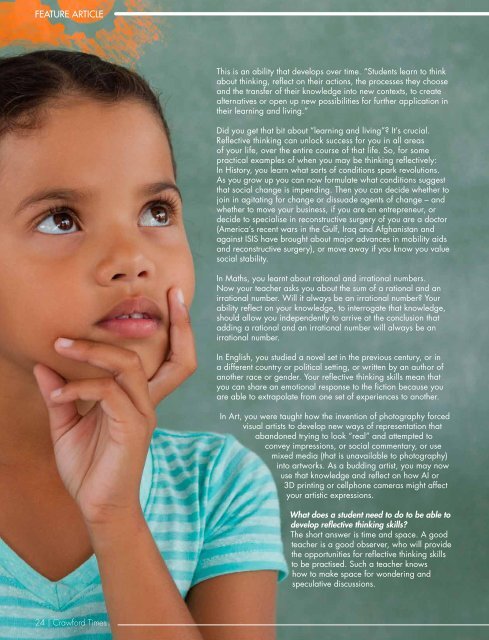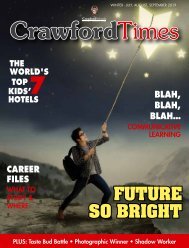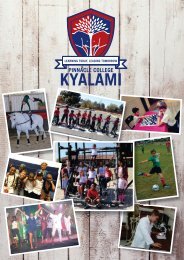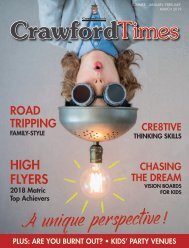Crawford Times 60 ONLINE
You also want an ePaper? Increase the reach of your titles
YUMPU automatically turns print PDFs into web optimized ePapers that Google loves.
FEATURE ARTICLE<br />
This is an ability that develops over time. “Students learn to think<br />
about thinking, reflect on their actions, the processes they choose<br />
and the transfer of their knowledge into new contexts, to create<br />
alternatives or open up new possibilities for further application in<br />
their learning and living.”<br />
Did you get that bit about “learning and living”? It’s crucial.<br />
Reflective thinking can unlock success for you in all areas<br />
of your life, over the entire course of that life. So, for some<br />
practical examples of when you may be thinking reflectively:<br />
In History, you learn what sorts of conditions spark revolutions.<br />
As you grow up you can now formulate what conditions suggest<br />
that social change is impending. Then you can decide whether to<br />
join in agitating for change or dissuade agents of change – and<br />
whether to move your business, if you are an entrepreneur, or<br />
decide to specialise in reconstructive surgery of you are a doctor<br />
(America’s recent wars in the Gulf, Iraq and Afghanistan and<br />
against ISIS have brought about major advances in mobility aids<br />
and reconstructive surgery), or move away if you know you value<br />
social stability.<br />
In Maths, you learnt about rational and irrational numbers.<br />
Now your teacher asks you about the sum of a rational and an<br />
irrational number. Will it always be an irrational number? Your<br />
ability reflect on your knowledge, to interrogate that knowledge,<br />
should allow you independently to arrive at the conclusion that<br />
adding a rational and an irrational number will always be an<br />
irrational number.<br />
In English, you studied a novel set in the previous century, or in<br />
a different country or political setting, or written by an author of<br />
another race or gender. Your reflective thinking skills mean that<br />
you can share an emotional response to the fiction because you<br />
are able to extrapolate from one set of experiences to another.<br />
In Art, you were taught how the invention of photography forced<br />
visual artists to develop new ways of representation that<br />
abandoned trying to look “real” and attempted to<br />
convey impressions, or social commentary, or use<br />
mixed media (that is unavailable to photography)<br />
into artworks. As a budding artist, you may now<br />
use that knowledge and reflect on how AI or<br />
3D printing or cellphone cameras might affect<br />
your artistic expressions.<br />
What does a student need to do to be able to<br />
develop reflective thinking skills?<br />
The short answer is time and space. A good<br />
teacher is a good observer, who will provide<br />
the opportunities for reflective thinking skills<br />
to be practised. Such a teacher knows<br />
how to make space for wondering and<br />
speculative discussions.<br />
24 | <strong>Crawford</strong> <strong>Times</strong>

















